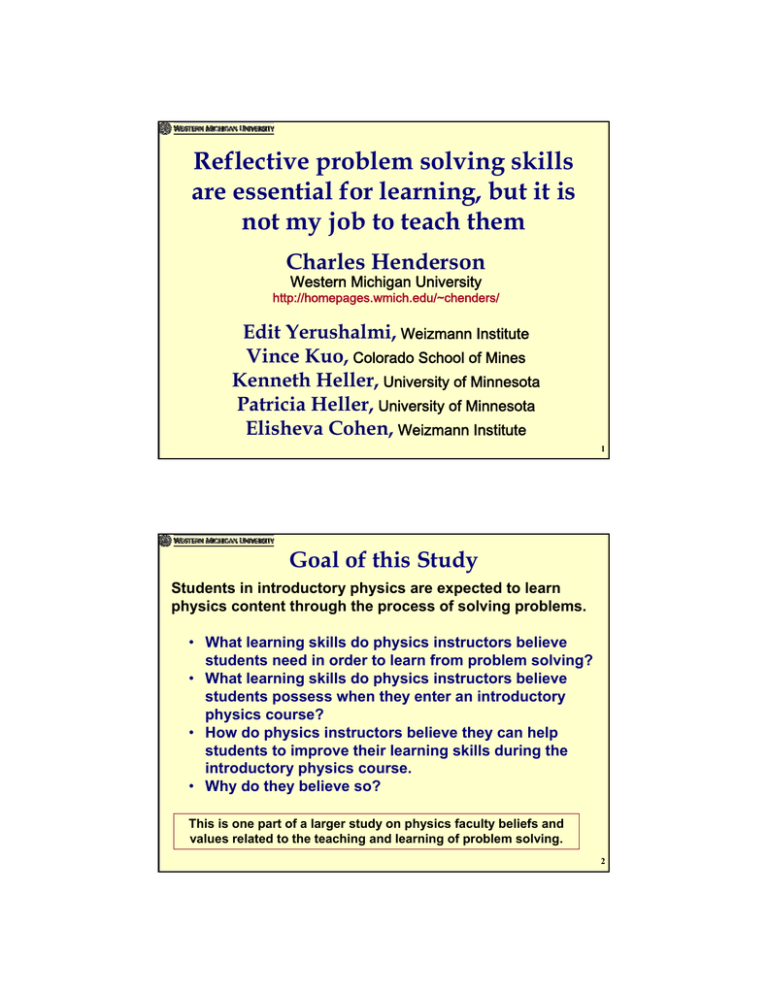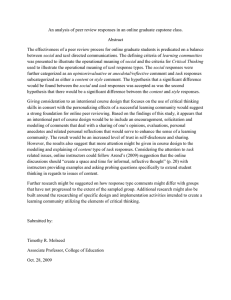Reflective problem solving skills are essential for learning, but it is
advertisement

Reflective problem solving skills are essential for learning, but it is not my job to teach them Charles Henderson Western Michigan University http://homepages.wmich.edu/~chenders/ Edit Yerushalmi, Weizmann Institute Vince Kuo, Colorado School of Mines Kenneth Heller, University of Minnesota Patricia Heller, University of Minnesota Elisheva Cohen, Weizmann Institute 1 Goal of this Study Students in introductory physics are expected to learn physics content through the process of solving problems. • What learning skills do physics instructors believe students need in order to learn from problem solving? • What learning skills do physics instructors believe students possess when they enter an introductory physics course? • How do physics instructors believe they can help students to improve their learning skills during the introductory physics course. • Why do they believe so? This is one part of a larger study on physics faculty beliefs and values related to the teaching and learning of problem solving. 2 Research design Data collection Sample: •6 Physics Instructors at U of MN, Randomly Selected out of 23 that meet selection criteria: taught introductory calculus-based physics course in the last 5 years Semi-Structured Interview Tool: •Based on concrete instructional artifacts (problem statements, instructor solutions, grading) •Interview questions: please describe how these artifacts are similar or different to yours. Please explain your reasons for having these artifacts the way you do Interviews were videotaped and the audio portion transcribed: ~ 30 pages of text/interview Data analysis Video- & audiotapes of interviews (~9 hrs) Concept Maps allow for: • the reduction of complex data into visual representations • explicit connections to be made between ideas that can then be tested • Identification of shared vs. idiosyncratic features 3 Research design Interview transcripts (~180 pages) Statements (~2400) Concept Maps (15 x 6 = 90) Combined Concept Map (15) 4 General Result: Combined Concept Map Perceived external constraints Physicist and instructional values limit Solving physics problems [Fig. 2] influence needed for Instructors' actions Students who can improve [Fig. 7] help Appropriate knowledge [Fig. 3] construct do not construct enough Typical students [Figs. 8,9] include Making Suggestions to encourage Reflectively Setting Constraints to encourage Work [Fig. 4] often sometimes Look/ Listen [Fig. 6] and can then Use Feedback [Fig. 5] on of Appropriate problems [Figs. 10,13] Providing Resources Individualized responses [Figs. 12,15] at/to at/to of Appropriate example solutions [Figs. 11,14] Lectures of are sometimes adapted to For more details, see: Yerushalmi, E., Henderson, C., Heller, K., & Heller, P., Kuo, V. (2007). Physics Faculty Beliefs and Values about the Teaching and Learning of Problem Solving Part I: Mapping the Common Core, Physical Review Special Topics: Physics Education Research, 3 (2), 020109. 5 Role of student To reflect on his work and compare it to that of the instructor Typical students [Figs. 8,9] Students who can improve [Fig. 7] often Reflectively sometimes Look/ Listen [Fig. 6] Work [Fig. 4] and can then on Use Feedback [Fig. 5] of Appropriate problems [Figs. 10,13] Individualized responses [Figs. 12,15] and can then on at/to at/to Lectures Students who succeed are reflective Use Feedback [Fig. 5] of of Appropriate example solutions [Figs. 11,14] Look/ Listen [Fig. 6] Work [Fig. 4] Appropriate problems [Figs. 10,13] Individualized responses [Figs. 12,15] at/to at/to of Appropriate example solutions [Figs. 11,14] Lectures Typical students are not reflective 6 Role of student Examples of reflective activities: Examples of typical student activities: “Students would analyze their test solution and maybe my test solution to see where the major differences are, and then try to work on it.” “When students do HW or solve problems it’s so tempting to just look at solutions after working 2 minutes if you don’t know what to do.” “you have to discipline yourself to say what, why did I write this down.” “go through the strategy part of the problem saying ‘what do I need to know for this problem, and what are the parameters that are specified, and what are the things that I have to calculate.’” “I try to get students to think consciously about their general approach… not just sit and wait for lightning bolts to strike.” “Students spend large numbers of hours just doing problems but not doing them with a disciplined approach.” “There are many students who make a mistake on the quiz and say ‘well, that was a mistake’ and then they’re not interested anymore.” 7 Role of instructor Instructors Suggest Reflectivity, but Require ‘Working’ Perceived external constraints limit Physicist and instructional values influence Instructors' actions include Making Suggestions to encourage Reflectively Setting Constraints to encourage Work [Fig. 4] Appropriate problems [Figs. 10,13] Providing Resources Individualized responses [Figs. 12,15] Appropriate example solutions [Figs. 11,14] Lectures of 8 Role of instructor “I often tell students that if they are having difficulty that what they should do is look at a lot of problems, not necessarily work them, but look at the problems and then go through the strategy part of the problem saying to themselves ‘what do I need to know for this problem . . .’” “What I often say is that they have to solve problems without looking at solutions, and if they get stuck, talk to someone specifically about what the next step would be, . . . so they don’t get . . . away without thinking on their own.” 9 Instructors are Aware of the Gap! “Unfortunately, there is a big gap between what I would like students to do with solutions that I post and what I'm fairly sure they are doing with them… A large fraction of students are focusing too much on the very problem at hand … as opposed to the structure of the problem.” “When I do solutions on the board during class I hope that students just see how a professional thinks about these sorts of things. Of course I suspect in many cases they adopt the superficiality of it.” 10 How Do Instructors Explain Why They Do Not Impose Reflective Practice? Three Perceived Constraints: 1. Workload: Instructors have limited time that they can commit to the course. “I think engaging students and getting them to do something, no matter how wrong it might be, getting to do something on their own while you help them is, I think, the key. It’s labor intensive though.” 2. Student Expectations: Students might react negatively to requirements such as providing a reasoned approach to the solution. “If I had given this a low score and the student came back and said ‘but I got it right’ I would tell them that they didn’t show that they were using the right principles. I usually give them the benefit of the doubt when grading.” 3. Assessment considerations: Instructors recognize that reflective practice is not assessed. “There’s nothing specifically that we test for that really brings these things [reflective problem-solving skills] out.” 11 How do Instructors Resolve the Conflict? Have Limited Expectations of What Students Will Learn “The types of things in this stack [reflective problem solving skills] are not built up over one course … I hope they learn some of it in the course, but it's not, these are things that aren't in the syllabus and that you hope over 4 years of a university education, that they cultivate.” Instructors don’t expect students to develop reflective skills during the course. Yet, they believe that students without these skills will not succeed. 12 Limited Expectations of What Students Will Learn Appropriate knowledge [Fig. 3] consists of consists of Knowledge & Skills Related to Problem Solving (1,2,3,4,5,6) Affective Characteristics (2) Expert Problem Solving Skills Are Not Learned solving novel problems (4) demonstrated by consists of consists of consists of consisst of consists of consists of PHYSICS CONCEPTS (1,2,3,4,5,6) APPROACH TO SOLVING A PROBLEM (1,2,3,4,5,6) SPECIFIC TECHNIQUES (1,2,5,6) SELF EVALUATION (1,2,3,4,6) Physicists beliefs about problem solving (1,3,6) Physicists style (5) which to students as used within can depend on learn well (4) which (2,3,4,6) which can be can be can be students don't learn (1) students learn somewhat (1,3,5) context of a particular problem (1,2,3,4,5,6) which which students learn somewhat (5) get a solution after deciding on approach (1,2,5,6) which which students learn well (2) General approach not tied to a particular problem (3,4,5) students learn somewhat (5) Evaluating if headed in right direction (1,3,4,6) which which students learn well (2,4) which students don't learn (1,3,6) which students don't learn (1) e.g. e.g. e.g. Working in an organized way (3,4) be aware of a difficulty (1,3,6) knowing what needs to be done (4) students learn somewhat (5) e.g. students don't learn (6) helps with (3,4) students learn somewhat (1,5,6) which Evaluating the answer (1,2,3,6) it is "macho" to put numbers in only at the end (5) e.g. that by considering reasonability (2,3,6) by checking units (1) Play around to see what approaches might be valuable (6) problem solving involves exploration (1,6) most problems cannot be solved in a single step (1) solving a problem is not always a linear process (1) solving problems is not a plug-andchug process (6) problems can be solved by logically applying the laws of physics (3) 13 Discussion Instructors highly value reflective practice. They perceive it as necessary for success in the course. Yet, they do not impose it on students. A possible explanation for this apparent conflict: It is a norm in introductory physics courses that reflective practice is not assessed. Thus it is a lower priority and instructors are not committed to invest time (their own and in class) to constrain students to achieve it. “If I had given this a low score and the student came back and said ‘but I got it right’ I would tell them that they didn’t show that they were using the right principles. I usually give them the benefit of the doubt when grading.” 14 Implications 1. We don’t have to invest effort to convince instructors of the need to develop reflective learning skills 2. A possible key for change – renewed assessment goals • Develop and suggest accessible assessment tools that assess reflective practice 15
